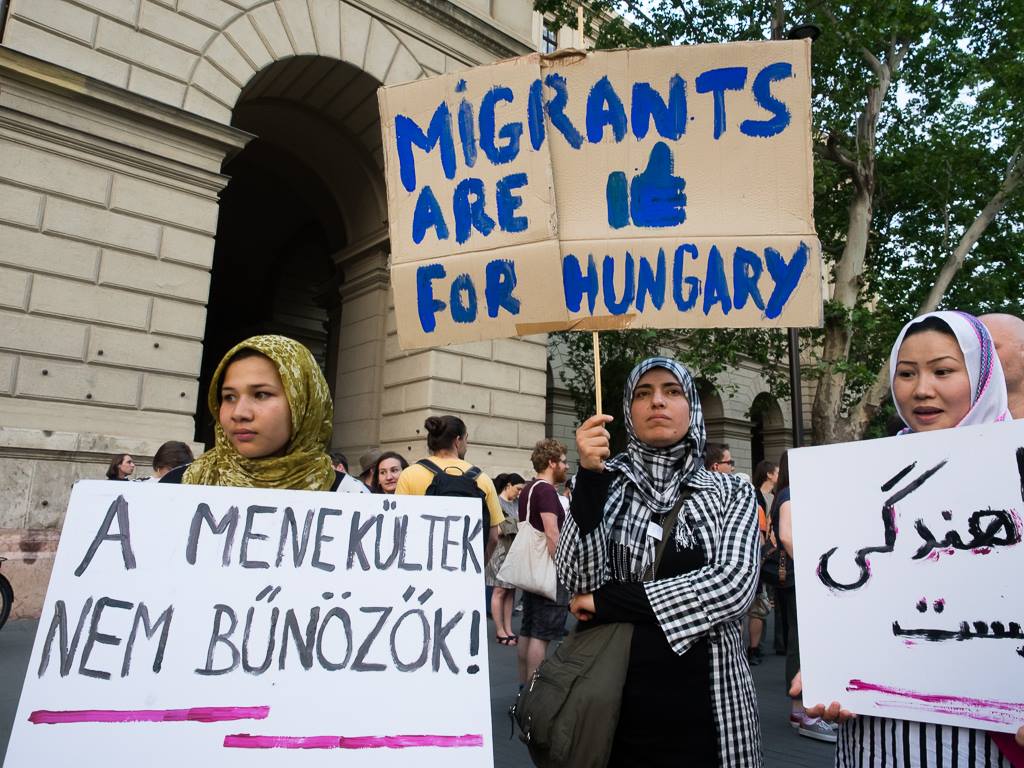
MigSzol demonstration in Budapest. Photo by Anna Vörös, courtesy of MigSzol Facebook page, used with permission.
As Europe grapples with the stream of people risking their lives on the Mediterranean to reach its borders, Hungarian authorities have stood out for their especially virulent anti-immigration rhetoric in recent weeks.
With Prime Minister Viktor Orbán leading the charge, the government mailed a 12-point questionnaire to over 8 million households at the beginning of May 2015 to gauge attitudes towards immigration. According to the government’s website, the consultation was initiated in order to assess public support for future policy changes, but it doesn't require particularly detailed examination to reveal bias and xenophobic undertones in its leading questions.
Upon receiving the questionnaire, many Hungarians took to social networks to comment that the questions therein set a tone of dread, firmly linking the issue of terrorism with the issue of immigration. In fact, the first question asks about ISIS and the deadly Charlie Hebdo attack in Paris, and does not mention immigration or immigrants at all:
Sokféle véleményt lehet hallani az erősödő terrorcselekményekkel kapcsolatban. Ön mennyire tartja fontosnak a terrorizmus térnyerését (a franciaországi vérengzés, az ISIS riasztó cselekményei) a saját élete szempontjából?
We hear different views on increasing levels of terrorism. How relevant do you think the spread of terrorism (the bloodshed in France, the shocking acts of ISIS) is to your own life?
The European Union doesn't get away unscathed either. The consultation laments the “mismanagement” of the EU's immigration policies and proposes that the Hungarian government implement stricter rules on its own:
2) Ön szerint az elkövetkező években lehet-e terrorcselekmény célpontja Magyarország?
3) Vannak, akik szerint a Brüsszel által rosszul kezelt bevándorlás összefüggésben van a terrorizmus térnyerésével. Ön egyetért ezekkel a véleményekkel?
[…]
7) Támogatná-e Ön a magyar kormányt, hogy Brüsszel megengedő politikájával szemben szigorúbb bevándorlási szabályozást vezessen be?
2) Do you think that Hungary could be the target of an act of terror in the next few years?
3) There are some who think that mismanagement of the immigration question by Brussels may have something to do with increased terrorism. Do you agree with this view?
[…]
7) Would you support the Hungarian Government in the introduction of more stringent immigration regulations, in contrast to Brussels’ lenient policy?
Other questions blur the line between documented and undocumented immigration and push the premise that immigration is a threat to Hungarians’ economic opportunities:
4) Tudta-e Ön, hogy a megélhetési bevándorlók törvénytelenül lépik át a magyar határt és az elmúlt időszakban húszszorosára nőt a bevándorlók száma Magyarországon?
5) Sokféle véleményt hallani a bevándorlás kérdésével kapcsolatban. Vannak, akik szerint a megélhetési bevándorlók veszélyeztetik a magyar emberek munkahelyeit és megélhetését! Ön egyetért ezekkel a véleményekkel?
4) Did you know that economic migrants cross the Hungarian border illegally, and that recently the number of immigrants in Hungary has increased twentyfold?
5) We hear different views on the issue of immigration. There are some who think that economic migrants jeopardise the jobs and livelihoods of Hungarians. Do you agree?
Reading a sentence as simple as, “recently the number of immigrants in Hungary has increased twenty-fold,” one can't help but wonder when exactly “recently” was, what kind of “immigrants” the question refers to, and what the “twenty-fold” increase is in comparison to. In fact, the number of asylum seekers has increased from about 19,000 in 2013 to 42,000 in 2014, but according to the UNHCR, only around 4,000 were granted refugee status or have their claims pending.
As seen above, the questionnaire, which cost the government 960 million forints (just over 3 million euros or 3.2 million US dollars), manipulates the respondents in a number of ways. Most glaringly, it presents Hungarians with a false dilemma when it comes to the possible answers they can choose. There are only three options, two-thirds of which are beneficial to the party line: “I fully agree,” “I tend to agree”, and “I do not agree” (or variations of those three, depending on the wording of the question). The option of “I somewhat disagree” is suspiciously absent.
Officials don't appear to be planning to make the results public.
‘No to xenophobia!’
Observers have pointed to Prime Minister Viktor Orbán and the ruling Fidesz's weakened political position as the reason behind their increased use of hardline right-wing rhetoric. In February 2015, a by-election was held to replace a Fidesz-KDNP coalition member of Parliament from Veszprém, who had taken on an EU commissioner position. In the by-elections, an independent candidate won and, as a result, Fidesz lost its overwhelming two-thirds majority in Parliament.
In addition to emphasizing the detrimental effects that the allegedly growing economic immigration has had for Hungary, Orbán has also called for “keeping the death penalty on the agenda” in response to the murder of a woman last month in the southwestern city of Kaposvár. The death penalty is banned in the EU.
The government's hostile rhetoric towards immigration and the questionnaire in particular have caused backlash among individuals and civil society in Hungary.
Rally in Budapest against Orbán's controversial questionnaire on “immigration and terrorism”: “No to xenophobia!” pic.twitter.com/48IPTB7UxK
— Peter Murphy (@MurphyPeterN) May 19, 2015
On May 19, MigSzol, a Budapest-based NGO working for migrant and refugee rights, organized a protest where participants were encouraged to fold the questionnaires into tiny paper boats and set them sail on the Danube. More than 1,000 people attended and according to the organization’s Facebook update, visits to their website skyrocketed.

Hungarian protesters launch paper boats made out of pages of the biased questionnaire, to represent the lost lives of illegal migrants. Photo by Anna Vörös, courtesy of MigSzol Facebook page, used with permission.
The Hungarian Helsinki Committee started a Tumblr blog to draw attention to the bias within the questionnaire, advising the public on ways to boycott the consultation and protest against its xenophobic tone, as well as offering facts about the real situation of migration in Hungary and Europe. The blog is also a space where Hungarian citizens share their own family histories of migration, persecution, and exile.
tiltakozz a bevándorlásról szóló látszatkonzultáció ellen! #bevandorlóvagyok http://t.co/CQJURlGgih pic.twitter.com/CzlWhQJQbI — Nagashi (@dieNagashi) May 14, 2015
Protest against the mock consultation against immigration! #bevandorlovagyok [I am migrant]
Image: I am Lajos [Lajos Kossuth, a Hungarian revolutionary], a refugee. If you send me home, they will hang me. “National consultation”: Send it back empty.
These initiatives, including the now widely used hashtag #bevandorlovagyok (I am migrant), seek to remind people that Hungarians come from a variety of backgrounds. Alienation and hostility promoted by the political agenda turns a blind eye to ethnic complexities and the peripatetic history of Central and Eastern Europe as well as the world as a whole. Just like MigSzol's protest of the questionnaire, we humans are like those small paper boats, drifting on the wide river of global turmoil towards always safer harbors.
Adelman, Lux, Bene, Kiss szudétavidéki német, felvédéki szász, olasz, kun, zsidó, horvát… #polimultikulti #bevándorlóvagyok — Arató Gergely (@tanbacsi) May 22, 2015
Adelman, Lux, Bene, Kiss [regional family names] German from Sudetenland, Saxon from the Highlands, Italian, Cumanian, Jewish, Croatian… #polimultikulti [“polymulticulti”, an abbreviation indicating a vast multicultural society] #bevándorlóvagyok [I am migrant]







8 comments
Good job Viktor Orban! Finally, a European leader with a backbone who stands up for his nation and people against the cultural marxists and Islamic horde.
Well, everyone in the whole world should go back to their home land if that is the case. They could only go to other countries for trade/business transaction purposes only. It’s really silly because there will be no space to accommodate those coming back to Europe…i.e. all the occupants of America continents, Asia Pacific, Australia, South Africa etc should troop home and return all that was taken. Let me think, hmm….. who is an Island? We all depend on one another. The funniest thing is, countries with nothing…always make loudest noise. No one loves violence. If you want to preach against terrorism, that’s fine. The blood stream/line of Hungary run vast…spans from Asia to mainland Europe. If everyone starts packing up, the land will be left vacant…just my point of view.